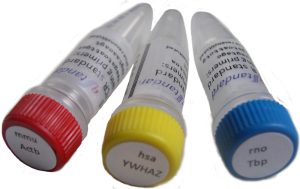|
£85 per single assay or five assays for £375
To order please send a Purchase Order to finance@qstandard.co.uk Free delivery within the UK |

|
Mouse
| Gene symbol | Accession number(s) | Product code | Amplicon length (bp) | Intron: span/flank | Intron length (bp) | Amplicon %GC |
|---|---|---|---|---|---|---|
| Actb | NM_007393 | mmu_Actb_001 | 186 | span | n/a | 55.7 |
| B2m | NM_009735 | mmu_B2m_001 | 71 | span | n/a | 53.5 |
| Gapdh | NM_008084 | mmu_Gapdh_001 | 133 | span | n/a | 53.4 |
| Hmbs | NM_013551 & NM_001110251 | mmu_Hmbs_001 | 73 | span | n/a | 49.3 |
| Hprt1 | NM_013556 | mmu_Hprt_001 | 91 | span | n/a | 62.6 |
| Pla2g12a | NM_023196 | mmu_Pla2g12a_001 | 187 | flank | 11440 | 56.7 |
| Rpl13 | NM_023281 | mmu_Rpl13_002 | 133 | span | 340 | 60.9 |
| Sdha | NM_016738 | mmu_Sdha_001 | 85 | no | n/a | 51.2 |
| Tbp | NM_013684 | mmu_Tbp_001 | 232 | span | n/a | 47.4 |
Rat
| Gene symbol | Accession number(s) | Product code | Amplicon length (bp) | Intron: span/flank | Intron length (bp) | Amplicon %GC |
|---|---|---|---|---|---|---|
| Actb | NM_031144 | rno_Actb_001 | 300 | flank | 214 | 68.6 |
| Gapdh | NM_017008 | rno_Gapdh_001 | 310 | span | n/a | 52.6 |
| Hmbs | NM_013168.2 | rno_Hmbs_001 | 151 | span | n/a | 52.3 |
| Hprt1 | NM_012583 | rno_Hprt1_002 | 115 | span | n/a | 40.9 |
| Rpl13 | NM_031101 | rno_Rpl13_001 | 76 | span | n/a | 61.8 |
| Sdha | NM_130482 | rno_Sdha_002 | 145 | span | n/a | 49.0 |
| Tbp | NM_001004198 | rno_Tbp_001 | 75 | span | n/a | 41.3 |
| Ywhaz | NM_013011.3 | rno_Ywhaz_001 | 148 | span | n/a | 52.0 |
- ? Primers have been designed to avoid 3′ SNPs and secondary structure (self-annealing)
- ? No secondary structure in the amplicon for any assay (positive delta G)
- ? Specificity has been checked by melt peak analysis and the presence of only a single band on a gel
- ? Standard curves down to 10 copies per reaction have been run for each assay and all show excellent linearity (R² >0.99) Efficiency (>95%) and sensitivity (repeat of 10 copies consistently detected)
- ? Primers have been tested at an annealing temperature of 57°C. Higher annealing temperatures (up to 60°C) are possible, but require individual validation

